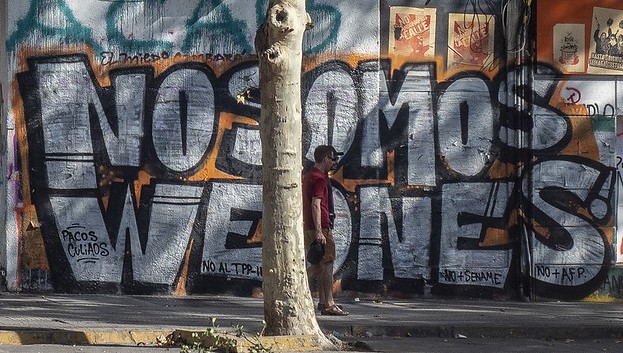The cry of a woman citizen
The merciless struggle between armed groups, to take control of the population sectors, ended this week with the death of three people and several wounded in the populous commune of La Florida, in the sector of Plaza Lircay, in the metropolitan area of Santiago, as a result of the exchange of shots, more than 70 rounds according to witnesses, from sub-machine guns.
In the same place of the shooting, the inhabitant, identified as Señora Ruth, made a speech, in front of the Chilean TV cameras, which with a sickening constancy bring the terrifying facts of blood day by day and to which with full emotion she cried out: “Dear politicians of the 16 parties, please change your party t-shirts and put on the t-shirt of Chile”. “Chile needs a strong law, children and young people are dying and I ask the 16 political parties to stop fighting and put on the shirt for Chile”.
The incident is an example of the escalation of gang violence in poor neighbourhoods, and the lack of laws to control it, which is why the woman emphasises her demand that they stop the individual quarrels of their collectives, and calls on them to put themselves in the shoes of the people who live day to day under laws far removed from their realities; discords where particular ideologies prevail over the real needs that affect us as a country.
These multiple and painful realities of the neighbourhoods also harbour the unjust pensions governed by a nefarious pension system and that, as Luis Mesina, national leader of the No+AFP Coordinating Committee, explains, are very far from being transformed into decent pensions, even after the presidential announcement of the new system to be implemented, which made the news this week.
This is how we permanently observe the naturalised economic inequality that governs daily life V/S the contingency pattern installed by the media controlled by the elite.
Boric is with falling polls despite his image changes. Since the ministerial change, President Boric, together with his image advisors, have made a series of symbolic modifications to his figure that place public attention and opinion on his person (whether or not he wears a tie, how he mobilises, etc.) rather than on the type of government he is leading, on the political alliances he must make in order to pass laws, on his omissions and abstentions on certain issues, and above all, on the implementation of public policies that have a social impact in a large part of the country.
These changes in his image have not managed to save him from the low approval ratings reported by different surveys, which also affect the actions of different public figures in the political ambit.
At the beginning of his mandate, the Chilean president had an approval rating of 50 % and a disapproval rating of only 20 %. But the situation has changed dramatically, already in April this year Gabriel Boric’s popularity in Chile fell from 50% to 36%, and the October sample tells us that he is falling faster than his predecessors in La Moneda, dropping 6 points compared to the previous measurement from 33% to 27%.
There is an urgent need to humanise a politics that is out of touch with the people.
The slowness of the presidential mandate in tackling the changes that citizens urgently require is the reason for the drop in popular approval polls, and marks a clear scenario of a rapprochement with the privileges of the government, which accommodates itself to the range of benefits offered by a national position and moves further and further away from the inequality suffered by the people, the same people who believed them and let them sit in the presidential chair.
From the TV morning shows, we learn how they have taken great pains to make news items such as the brother’s famous dog, the absence of ties, placing him at a formal intellectual level/aspirational European, the current president’s toques and the bike rides in a suit, as a marketing formula for forced fame.
While the popular aspirations set out the only mission after the outbreak, to leave the way paved for a new constitution, today this is taken away from an actively organised citizenry and handed on a silver platter to the same servile entities of the business class as always, lacking the political will to change the laws of Chile, leaving us in great uncertainty in relation to the future.
We are back to the politics of bingos, raffles, unique dishes and solidarities where “the people help the people”, in response to a lack of humanising and responsible politics at governmental level, and which we are convinced cannot happen again as a solution to national problems.
Chile can no longer tolerate ineffective responses to violence, where we regret to see innocent neighbours die, as this time in the commune of La Florida. We condemn the use of weapons in every sense that threaten human integrity, without ignoring the economic violence that we have historically denounced. We stress the need to accept the failure of the current model, which merits seriously addressing an inflection point, getting out of the fishbowl and promoting an unconditional universal basic income, as a new starting point, with rules for a development that is decoupled from the dispossession of wage-earning forces.
It is for these and other reasons that we continue, together with many good and committed people, to try to open spaces for active non-violence, from all possible platforms, to help us on a path towards a more dignified, more humane and more libertarian society. We insist!
Collaborative writing by Sylvia Hidalgo Rojas; Sandra Arriola Oporto; M. Angélica Alvear Montecinos; Gladys Mendoza Jaque; Guillermo Garcés Parada and César Anguita Sanhueza. Political Commission










